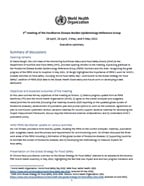Foodborne Disease Burden Epidemiology Reference Group (FERG)
Established first in 2007, Foodborne Disease Burden Epidemiology Reference Group (FERG) is a WHO’s technical advisory group that advises WHO on the methodology to estimate the burden of foodborne diseases. Its work now also includes advising WHO on the methodology to develop and monitor global food safety indicators.

WHO/NFS Yuki Minato
©
Credits
Call for expression of interest
Publications
All →
23 October 2024
WHO Foodborne Disease Burden Epidemiology Reference Group for 2021–2024: second meeting report, 19 October-2...
This report describes the second meeting of the WHO Foodborne Disease Burden Epidemiology Reference Group for 2021-2024. This second meeting...
19 October 2023
Whole genome sequencing as a tool to strengthen foodborne disease surveillance and response: module 1:...
Whole genome sequencing (WGS) is a laboratory technique that has the potential to change how we detect and monitor microbial hazards in the food chain,...
19 October 2023
Whole genome sequencing as a tool to strengthen foodborne disease surveillance and response: module 2:...
Whole genome sequencing (WGS) is a laboratory technique that has the potential to change how we detect and monitor microbial hazards in the food chain,...
Documents

22 June 2022
Third meeting of the Foodborne Burden Disease Epidemiology Reference Group (FERG2) 2021-2024
This third meeting is organized to reach an agreement on the concrete plan of actions towards 2025 reporting on the updated global estimates of the burden...
